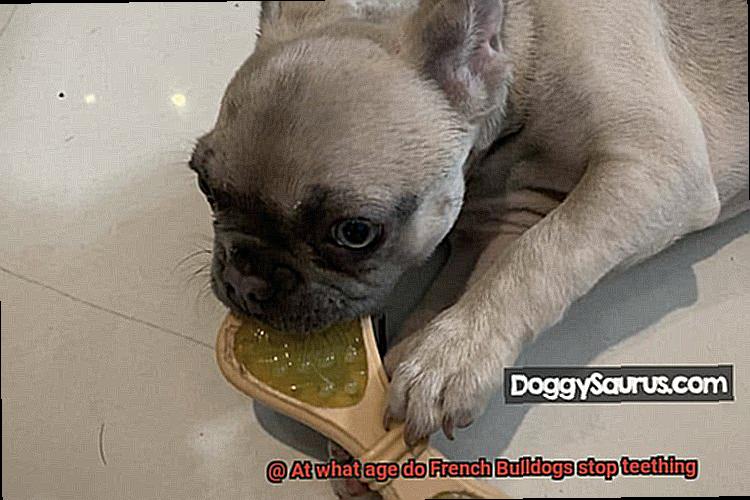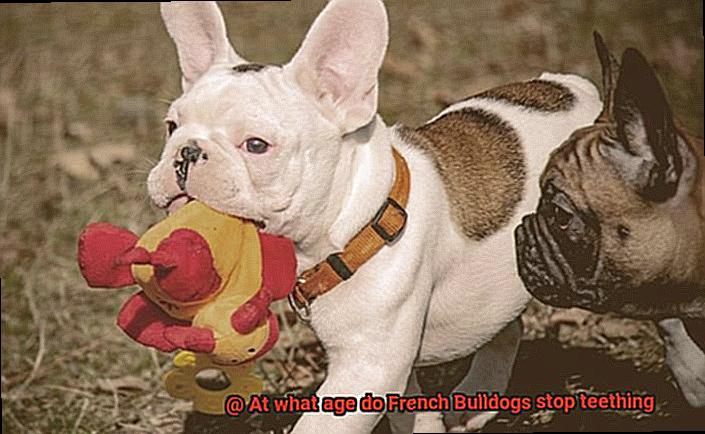At what age do French Bulldogs stop teething?
Teething. It’s a rite of passage for every French Bulldog pup. Just like human babies, these cuties go through that awkward phase when their baby teeth fall out and big kid teeth take their place. But when does this teething madness finally come to an end?
Usually, French Bulldog puppies start teething at around three to four months old. That’s when those tiny teeth start wiggling loose, making room for the stronger, more grown-up chompers. The whole teething shebang can last a few months until all the adult teeth have popped up, usually by the time they’re six to eight months old.
Now, brace yourself because during this teething extravaganza, your Frenchie might act a little…chew-crazy. You know what I mean – they’ll gnaw on anything they can get their paws on. Furniture? Yep. Shoes? Oh yeah. Even their own toys might not be safe from those relentless jaws. And watch out for some swollen or bleeding gums too – it might lead to drool city.
But don’t fret. There are ways to survive this chew-fest with your sanity intact. Make sure your furry friend has plenty of chew toys and treats that are actually meant for chewing (not your favorite pair of sneakers). This will help save your precious belongings and give them some much-needed relief.
Understanding the ins and outs of teething can make life easier for both you and your French Bulldog pal. Stay tuned for our next blog post where we’ll dish out some top-notch tips on how to manage teething discomfort and keep that pup grinning from ear to ear.
So, if you’re wondering when exactly your French Bulldog will stop using everything as a chew toy, take heart. Usually, by the time they hit six to eight months old, the teething saga will come to a close. Just keep an eye on their behavior, offer up some chewy goodies, and soon enough, they’ll have a dazzling set of grown-up teeth that’ll make you proud.
At what age do French Bulldogs stop teething
Contents
- 1 At what age do French Bulldogs stop teething
- 2 When Do French Bulldogs Start Teething?
- 3 How Long Does the Teething Process Last for French Bulldogs?
- 4 Signs of Teething in French Bulldogs
- 5 How to Manage a French Bulldog’s Teething Phase
- 6 The Benefits of Good Dental Hygiene During the Teething Process
- 7 What to Do If Your French Bulldog Experiences Excessive Pain or Discomfort During the Teething Process
- 8 Conclusion
As your furry friend grows, they will go through various developmental stages, including teething. Understanding the teething process and knowing when French Bulldogs typically stop teething can help you provide the best care and support for your pup during this crucial time. In this article, we will explore the age at which French Bulldogs stop teething and provide tips to ensure their dental health.
When Does Teething Begin?
Like all puppies, French Bulldogs start teething around three to four months of age. This is when their baby teeth begin to fall out, making way for their adult teeth. During this phase, you may notice your puppy exhibiting signs of discomfort, such as increased drooling and a strong urge to chew on objects. These behaviors are natural responses to alleviate the pain and pressure in their gums.
How Long Does Teething Last?
The teething process in French Bulldogs typically lasts until they are around six to seven months old. By this time, their adult teeth should have fully grown in, replacing the baby teeth. However, it’s important to remember that every dog is unique, and some French Bulldogs may finish teething earlier or later than others.
Managing Teething Discomfort:
To help your French Bulldog navigate the teething phase with minimal discomfort, there are several steps you can take:
- Provide Appropriate Chew Toys: Offer a variety of safe and durable chew toys specifically designed for teething puppies. These toys can help soothe your pup’s gums while redirecting their chewing behavior away from your belongings.
- Maintain Good Oral Hygiene: Brushing your French Bulldog’s teeth regularly during the teething process is vital for their dental health. Introduce toothpaste formulated for dogs and use a soft-bristled toothbrush to gently clean their teeth and gums.
- Monitor Chewing Habits: Supervise your French Bulldog’s chewing habits to ensure they are not damaging their gums or teeth. Avoid giving them hard objects that could cause injury or fracture their new teeth.
- Consult with a Veterinarian: If you have any concerns about your French Bulldog’s teething process or if they seem to be experiencing excessive pain or discomfort, it’s best to consult with a veterinarian. They can assess your pup’s oral health and provide guidance on managing teething-related issues.
When Do French Bulldogs Start Teething?
French Bulldogs, like all puppies, go through the teething process as they transition from puppyhood to adulthood. This can be a challenging time for both the pup and the owner, but with proper knowledge and preparation, you can help ease your furry friend’s discomfort and protect your belongings from their chewing tendencies.
Typically, French Bulldogs start teething around 3 to 4 months of age. This is when their baby teeth, also known as deciduous teeth, begin to fall out and make way for their permanent adult teeth. The teething phase usually lasts for a few months, with most French Bulldogs having their adult teeth fully grown in by the age of 6 to 7 months.
During this teething period, your French Bulldog may exhibit certain symptoms, such as drooling excessively, chewing on objects more than usual, and increased irritability. These behaviors are their way of soothing their sore gums. It’s essential to provide appropriate teething toys and chew items to redirect their chewing instincts and alleviate discomfort. Look for durable toys specifically designed for teething puppies that are safe and non-toxic.
Maintaining good dental hygiene is crucial during this time. Regularly brushing your French Bulldog’s teeth using a dog-friendly toothbrush and toothpaste can help prevent plaque buildup and gum disease. Additionally, scheduling regular dental check-ups with a veterinarian is important to monitor their dental health and address any issues that may arise.
It’s important to note that some French Bulldogs may experience delayed teething. If your puppy hasn’t started teething by 5 months of age or if you notice any abnormalities in their dental development, it’s best to consult with a veterinarian for further evaluation and guidance.
How Long Does the Teething Process Last for French Bulldogs?
In this blog post, we’ll explore the duration of the teething process for French Bulldogs, offer tips to alleviate discomfort, and provide essential dental care advice.
When Does Teething Start and End?
The teething process in French Bulldogs typically begins around 3 to 4 months of age. At this time, their baby teeth start to fall out, making way for the permanent adult teeth. The teething phase can last up to 7 to 8 months, with most French Bulldogs having a full set of adult teeth by this time.
Signs of Teething:
During the teething period, you might notice some changes in your French Bulldog’s behavior. They may exhibit increased chewing behavior as a way to alleviate discomfort in their gums. It’s essential to provide appropriate teething toys and chews to redirect their chewing behavior away from household items or furniture. Additionally, your Frenchie may drool more than usual and display signs of gum sensitivity, such as rubbing their face against objects.
Tips for Managing Teething:
To help ease your French Bulldog’s teething discomfort, consider the following tips:
- Provide appropriate teething toys and chews: Look for durable toys specifically designed for teething puppies. These toys should be safe, non-toxic, and able to withstand your Frenchie’s strong jaws.
- Offer softer food options: Teething can cause temporary changes in appetite. Your puppy may prefer softer foods during this time or have difficulty eating hard kibble. Consider adding wet food or soaking dry kibble in water to make it easier for them to chew.
- Establish good oral hygiene habits: Introduce regular dental care, such as brushing your Frenchie’s teeth or using dental wipes. This will help prevent plaque buildup and gum disease, ensuring your pup has fresh breath and healthy teeth.
- Be patient and understanding: Teething can be uncomfortable for French Bulldogs, leading to changes in behavior and occasional grumpiness. Show patience and understanding during this stage, providing extra love and attention to comfort your furry friend.
Seeking Veterinary Care:
While the teething process is a normal part of your Frenchie’s development, it’s essential to monitor their progress. If you notice any concerns or complications, such as delayed teething or abnormal dental development, consult with a veterinarian for further evaluation and guidance.
Signs of Teething in French Bulldogs
The dreaded teething stage – that time when your cute little French Bulldog transforms into a chewing machine. But fear not, dear reader. With our expert guidance, you’ll be equipped to handle this challenging but temporary phase with ease.

Drool-a-palooza: Excessive Salivation
Picture this: Your adorable Frenchie, with a constant dribble of saliva cascading from their mouth. Welcome to the world of excessive drooling. This is one of the first signs that your pup is teething. Their little mouths are working overtime to produce saliva, which helps soothe those achy gums. So keep a towel handy and embrace the slobber.
Chew on This: A Chomping Frenzy
If you find your French Bulldog munching on everything in sight, from shoes to furniture, you can blame it on teething. Those pesky gums are causing discomfort, and chewing provides much-needed relief. Ensure you have plenty of appropriate chew toys on hand to redirect their chomping frenzy and save your favorite pair of sneakers.
Gums Gone Wild: Swollen and Inflamed
Have you noticed your Frenchie’s gums looking redder and puffier than usual? That’s a telltale sign of teething. Swollen and inflamed gums are common during this stage, making them more sensitive to touch. So when examining their mouth, be gentle to avoid any unnecessary discomfort.
Appetite Amnesia: The Food Dilemma
Is your ravenous eater suddenly turning up their snout at mealtime? Don’t fret; it’s likely just a temporary loss of appetite due to teething. The pain in their gums can make it uncomfortable to eat, resulting in a decrease in food consumption. Keep an eye on their overall nutrition during this time, and consult with your vet if you have any concerns.
Behavioral Blues: Irritability and Restlessness
Teething can turn even the calmest French Bulldog into a grumpy, restless ball of energy. The discomfort in their gums can make them more irritable than usual, causing behavioral changes. They may have trouble sleeping, too, thanks to those bothersome gums. It’s essential to provide extra love and patience during this phase as they navigate their way through the teething blues.
When to Raise the Alarm: Seeking Veterinary Assistance
While teething is a normal process, it shouldn’t cause severe pain or illness. If you notice excessive bleeding, persistent refusal to eat, or other concerning symptoms, it’s crucial to seek veterinary assistance. Your trusted vet will be able to evaluate your Frenchie’s condition and provide appropriate treatment if necessary.
How to Manage a French Bulldog’s Teething Phase
In this blog post, I will share my knowledge and personal experiences to guide you through this sometimes overwhelming period. So, grab a cup of coffee and let’s dive into managing your French Bulldog’s teething phase.
Understanding the Teething Process:
The teething phase typically begins around 3 to 4 months of age and lasts until about 6 months old. During this time, your Frenchie’s baby teeth will fall out, making way for their permanent pearly whites. It’s important to remember that each dog is unique, and some may experience teething earlier or later than others.
Provide Appropriate Chew Toys:
Chew toys are an absolute must-have during the teething phase. Look for toys specifically designed for teething puppies, made from soft rubber or nylon that can soothe their sore gums. Avoid giving them toys that are too hard or small, as they can pose a choking hazard or damage their teeth.
Supervise and Redirect Chewing Behaviors:
Keep a close eye on your French Bulldog during this phase to prevent them from chewing on inappropriate items like shoes or furniture. When you catch them in the act, calmly remove the item and replace it with an appropriate chew toy. Positive reinforcement, such as praise or treats, can help reinforce good chewing habits.
Cold Treats for Relief:
Just like us humans, French Bulldogs find comfort in cold treats during the teething phase. Freeze a wet washcloth or a chew toy and offer it to your pup to gnaw on. The coldness not only numbs their gums but also provides temporary relief from the discomfort.
Exercise and Distraction:
Regular exercise is crucial during the teething phase. Physical activity helps distract your Frenchie from the pain and redirects their energy towards more appropriate behaviors. Play a game of fetch or take them for a walk to keep them engaged and tire them out.
Dental Hygiene Matters:
Good oral hygiene is essential for your French Bulldog’s long-term dental health. Start brushing their teeth with a dog-friendly toothbrush and toothpaste made specifically for dogs. This habit will help prevent dental issues down the road and keep their smile sparkling.
The Benefits of Good Dental Hygiene During the Teething Process
Teething is a natural process that occurs in all puppies, including French Bulldogs. It can be a challenging time for both puppies and their owners, but with good dental hygiene practices, you can ensure your furry friend’s dental health is well taken care of. In this blog post, we will explore the benefits of maintaining good dental hygiene during the teething process for French Bulldogs.
Relieves discomfort and pain:
Teething can be a painful experience for puppies as their gums become swollen and sensitive. Regular brushing with a soft-bristled toothbrush and puppy-friendly toothpaste can help soothe their gums and alleviate discomfort. By providing relief, you can make the teething process more bearable for your French Bulldog.
Promotes healthy adult teeth growth:
Proper dental care during teething ensures that your French Bulldog’s adult teeth come in correctly aligned and strong. Regular brushing helps remove plaque and food particles that can hinder the growth of healthy adult teeth. By promoting proper alignment, you reduce the risk of future dental problems.
Prevents dental diseases:
Teething makes puppies more vulnerable to dental diseases such as gum disease and tooth decay. Regular brushing helps remove plaque and food particles that can lead to bacterial growth, reducing the risk of these conditions. By starting good dental hygiene habits early on, you set the foundation for optimal oral health.
Establishes lifelong oral health habits:
By making dental care a regular part of your French Bulldog’s grooming routine during the teething process, you instill good habits that will benefit them throughout their life. This includes regular dental check-ups and professional cleanings from a veterinarian. By prioritizing dental hygiene now, you are ensuring a lifetime of healthy smiles for your furry companion.
What to Do If Your French Bulldog Experiences Excessive Pain or Discomfort During the Teething Process
In this guide, we’ll discuss the signs to look out for and provide practical tips to ensure your furry friend gets through this stage with ease. Let’s dive in.
Recognize the Signs of Discomfort:
During teething, your French Bulldog may exhibit signs of excessive pain or discomfort. Keep an eye out for increased drooling, chewing on objects more than usual, reluctance to eat or drink, irritability, and even crying or whimpering. If you notice any of these signs, it’s essential to take action.
Provide Soothing Teething Toys:
Teething toys are a great way to help your French Bulldog find relief. Look for toys specifically designed for teething puppies, made of soft rubber or with textured surfaces that massage their gums. You can also try freezing the toys before giving them to your pup, as the cold temperature can provide additional numbing relief.
Frozen Treats for Cooling Comfort:
Another way to soothe your French Bulldog’s gums is by offering frozen treats or ice cubes made from low-sodium chicken or beef broth. The cold temperature not only numbs their gums but also provides a tasty distraction from the pain. Just make sure to supervise them while they enjoy these treats.
Adjust Their Diet:
If your French Bulldog is having trouble eating due to sore gums, you may want to consider adjusting their diet temporarily. Softening their food by mixing it with water or switching to wet food can make it easier for them to eat without causing further irritation.
Seek Veterinary Guidance:
If your French Bulldog continues to experience excessive pain or discomfort despite your efforts, it’s crucial to consult with your veterinarian. They can examine your dog’s mouth and gums to rule out any underlying issues and provide additional pain relief options if necessary.
Conclusion
French Bulldogs typically stop teething around the age of six to eight months.
During this time, they may experience discomfort and exhibit behaviors such as chewing on objects or excessive drooling. It is important for owners to provide appropriate teething toys and supervise their furry friends to prevent any damage to furniture or personal belongings.
Remember, patience is key during this stage as it is a natural part of a French Bulldog’s development.




